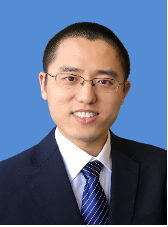Faculty Candidate Seminar
Power Electronics Hardware Accelerating Grid Technology Evolution and Deployment
Add to Google Calendar

Abstract:
Power electronics innovations have fundamentally changed the nature of the electrical power grid as a network system. Recent advances in power electronics hardware, including devices, circuits, and converters, contribute to enabling more penetration of clean and renewable energy resources into the power grid, bringing significant improvements in controllability, performance, energy availability, and resilience. The benefits are not only restricted to the grid. Modern power electronics hardware also promotes wide spreading of microgrids in emerging applications, such as airplanes, ships, electric vehicles, data centers, and smart homes.
This presentation introduces recent achievements in the cutting-edge power electronics hardware development for grid applications, a novel solid-state circuit breaker (SSCB) technology. To fill the current technology gap, a modular SSCB technology is investigated to provide fast and reliable protection for medium voltage DC (MVDC) power system in the 1-kV to 100-kV range. A 4-kV/2-kA prototype has been demonstrated, which achieves a world-record efficiency of 99.98%, providing a short-circuit fault interruption capability within tens of microseconds. This presentation covers key technical breakthroughs in implementing the SSCB technology.
Speaker Bio:
Dr. Fei Lu is an assistant professor in the Department of Electrical and Computer Engineering at Drexel University. He received his Ph.D. degree in Electrical Engineering from the University of Michigan-Ann Arbor in 2017. Before this, he received the BS and MS degrees from Harbin Institute of Technology, China, in 2010 and 2012, respectively.
His research interest focuses on high power and high voltage power electronics technology leveraging next generation wide bandgap semiconductor devices, especially for smart grid and transportation electrification applications. His research has been funded by ARPA-E, DOE, DOT, NSF, PA State, and leading industry companies. Over the past few years, his research papers have received ten awards from outstanding IEEE journals and conferences, including three Prize Paper Awards from IEEE Transactions on Power Electronics.
 MENU
MENU 
